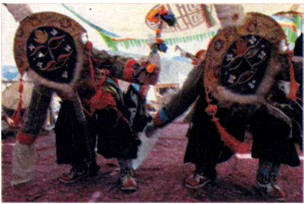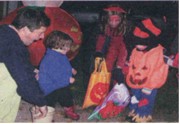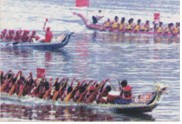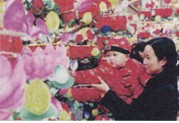普通高中课程标准实验教科书 英语必修3 Unit 1 Festivals around
时间:2009-09-19 08:32:20
搜索关注在线英语听力室公众号:tingroom,领取免费英语资料大礼包。
(单词翻译)
Festivals and celebrations of all kinds have been held everywhere since ancient times. Most ancient festivals would celebrate the end of cold weather, planting in spring and harvest in autumn. Sometimes celebrations would be held after hunters had caught animals. At that time people would starve if food was difficult to find, especially during the cold winter months. Today's festivals have many origins, some religious, some seasonal1, and some for special people or events.Festivals of the Dead
Some festivals are held to honour the dead or to satisfy the ancestors, who might return either to help or to do harm. For the Japanese festival Obon, people should go to clean graves2 and light incense3 in memory of their ancestors. They also light lamps and play music because they think that this will lead the ancestors back to earth. In Mexico, people celebrate the Day of the Dead in early November. On this important feast4 day, people eat food in the shape of skulls5 and cakes with "bones" on them. They offer food, flowers and gifts to the dead. The Western holiday Halloween also had its origin in old beliefs about the return of the spirits of dead people. It is now a children's festival, when they can dress up and go to their neighbours' homes to ask for sweets. If the neighbours do not give any sweets, the children might play a trick on them.
Festivals to Honour People
Festivals can also be held to honour famous people. The Dragon Boat Festival in China honours the famous ancient poet, Qu Yuan.In the USA, Columbus Day is in memory of the arrival of Christopher Columbus in the New World. India has a national festival on October 2 to honour Mohandas Gandhi, the leader who helped gain India's independence from Britain.
Harvest Festivals
Harvest and Thanksgiving festivals can be very happy events. People are grateful because their food is gathered for the winter and the agricultural work is over. In European ountries, people will usually decorate churches and town halls with flowers and fruit, and will get together to have meals. Some people might win awards for their farm produce, like the biggest watermelon or the most handsome rooster. China and Japan have mid-autumn festivals, when people admire the moon and in China, enjoy mooncakes.
Spring Festivals
The most energetic and important festivals are the ones that look forward to the end of winter and to the coming of spring. At the Spring Festival in China, people eat dumplings, fish and meat and may give children lucky money in red paper. There are dragon dances and carnivals6, and families celebrate the Lunar New Year together. Some Western countries have very exciting carnivals, which take place forty days before Easter, usually in February. These carnivals might include parades, dancing in the streets day and night, loud music and colourful clothing of all kinds. Easter is an important religious and social festival for Christians7 around the world. It celebrates the return of Jesus from the dead and the coming of spring and new life. Japan's Cherry Blossom8 Festival happens a little later. The country, covered with cherry tree flowers, looks as though it is covered with pink snow.
People love to get together to eat, drink and have fun with each other. Festivals let us enjoy life, be proud of our customs and forget our work for a little while.
Festivals and celebrations of all kinds have been held everywhere since ancient times. Most ancient festivals would celebrate the end of cold weather, planting in spring and harvest in autumn. Sometimes celebrations would be held after hunters had caught animals. At that time people would starve if food was difficult to find, especially during the cold winter months. Today's festivals have many origins, some religious, some seasonal, and some for special people or events.




Festivals of the Dead
Some festivals are held to honour the dead or to satisfy the ancestors, who might return either to help or to do harm. For the Japanese festival Obon, people should go to clean graves and light incense in memory of their ancestors. They also light lamps and play music because they think that this will lead the ancestors back to earth. In Mexico, people celebrate the Day of the Dead in early November. On this important feast day, people eat food in the shape of skulls and cakes with "bones" on them. They offer food, flowers and gifts to the dead. The Western holiday Halloween also had its origin in old beliefs about the return of the spirits of dead people. It is now a children's festival, when they can dress up and go to their neighbours' homes to ask for sweets. If the neighbours do not give any sweets, the children might play a trick on them.
Festivals to Honour People
Festivals can also be held to honour famous people. The Dragon Boat Festival in China honours the famous ancient poet, Qu Yuan.In the USA, Columbus Day is in memory of the arrival of Christopher Columbus in the New World. India has a national festival on October 2 to honour Mohandas Gandhi, the leader who helped gain India's independence from Britain.
Harvest Festivals
Harvest and Thanksgiving festivals can be very happy events. People are grateful because their food is gathered for the winter and the agricultural work is over. In European ountries, people will usually decorate churches and town halls with flowers and fruit, and will get together to have meals. Some people might win awards for their farm produce, like the biggest watermelon or the most handsome rooster. China and Japan have mid-autumn festivals, when people admire the moon and in China, enjoy mooncakes.
Spring Festivals
The most energetic and important festivals are the ones that look forward to the end of winter and to the coming of spring. At the Spring Festival in China, people eat dumplings, fish and meat and may give children lucky money in red paper. There are dragon dances and carnivals, and families celebrate the Lunar New Year together. Some Western countries have very exciting carnivals, which take place forty days before Easter, usually in February. These carnivals might include parades, dancing in the streets day and night, loud music and colourful clothing of all kinds. Easter is an important religious and social festival for Christians around the world. It celebrates the return of Jesus from the dead and the coming of spring and new life. Japan's Cherry Blossom Festival happens a little later. The country, covered with cherry tree flowers, looks as though it is covered with pink snow.
People love to get together to eat, drink and have fun with each other. Festivals let us enjoy life, be proud of our customs and forget our work for a little while.


Wangguo Festival


 收听单词发音
收听单词发音 




